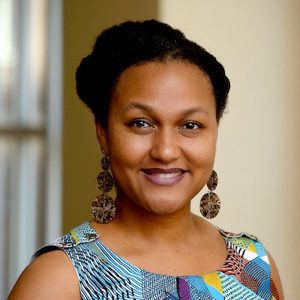In her work as postdoctoral fellow with the Program in Racism, Immigration, and Citizenship, Jasmine Blanks Jones emphasized the importance of combining academic research with community engagement. She has integrated her research interests with the community-oriented programming she now organizes through the Center for Social Concern and in her teaching for the Chloe Center.
Embodied practices in programming
In developing programs on campus, I focused on the need to honor the legacy of the Black ancestors, subjected to centuries of forced, racialized migration, who were enslaved at Homewood. To do so, I thought about what kind of a physical body can play the part of someone who was enslaved? What constitutes a sincere and compassionate performance in a way that resonates with an audience, draws them in, and makes them want to learn more? To this end, I organized events such as the Ritual of Remembrance and the Walk of Remembrance, which focused on knowledge co-creation through performance and participation in practices of embodied ancestral remembrance.
My research focuses on embodied practices allowed me to conceptualize events that would honor enslaved peoples whose stories were never told and attempt to collectively cultivate an awareness of these absences. Engaging with communities whose voices are often not listened to is central to my work, and I think a lot about how embodied practices can help carve out spaces that honor the knowledge of these communities.
Amplifying silenced voices
My teaching also focuses heavily on how the arts can help amplify silenced voices and magnify the work people are already doing to make their own lives better and more meaningful. In particular, I focus on youth in Liberia—a group that is silenced both politically and in discourses of international development—and how children have used the arts to make themselves heard. This was important for me in thinking about the Walk of Remembrance and Ritual of Remembrance as well.
Through the arts, we can bring together the university community to discuss topics that have long been silenced—parts of our history that are often not heard as clearly as they should be, or that make some people uncomfortable to talk about. These stories are important to share because they’re not just about the past; we’re talking about things that impact the everyday of many people: students of color who have been admitted at greater and greater numbers at Hopkins, staff who continue to labor to build this institution, and community members who have varying levels of comfort with even coming on to the campus. The arts give voice to these stories in a way that’s different from reading about these experiences or hearing about them in a lecture.
